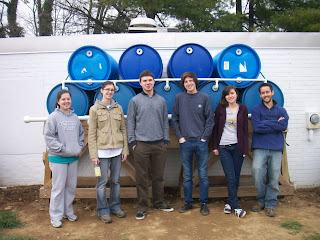So I've been saying for years that I wanted to start composting. A few weeks ago a friend of mine told me about the wonderful world of vermaculture or earthworm assisted composting. Using earthworms to help with composting seems to expedite the process of breaking down food and provides you with a high grade compost to use in your garden.
With the additional help of a few internet videos I made it my mission to get a vermaculture bin started and I would like to share it with you. If you have a garden or potted plants this is a great way to dispose of food scraps and in turn obtain highly nutritious plant food. Additionally, as the worms begin to break down the food, liquid called "worm tea" will build up and collect in your bin. This liquid is a fantastic fertilizer and can be used in your garden as well. Most sources say that it is also "very powerful" and should be diluted with water before you use it.
For this project you will need two sturdy plastic bins (I used two 10 gallon bins but a smaller size will do just as well), old newspaper with soy based ink, a drill or other device to create air holes, approximately 60 earthworms (two containers), and water. Certain species of earthworm work better than others. Most sites suggest the red wiggler worms and recommend against night crawlers but I am using trout worms which seem to fair very well. Worms are usually sold at sports supply stores or even farmer's markets. As for the newspaper make sure you find some with soy based ink. Most national newspapers use soy based inks so that shouldn't be hard to find. In total I only spent about $15 to create my bin. Happy composting!
Biologists note: When you decide to use the compost produced by your vermaculture bin in your garden it will probably be best to keep all worms in your bin and out of the garden. The earthworm species sold at your local bait store may be non-native and shouldn't be introduced into the environment.
Step 1: Stack your two plastic bins inside of one another and use a drill to poke air holes in the top bin. You also need to drill holes in the bottom of the top bin so the "worm tea" can drain through and collect in the bottom bin.
Step 2: Tear your newspaper into strips. You want to use enough paper to create a bed for your earthworms.
Step 3: Using a watering jug dampen the newspaper. It is important to only dampen the paper slightly. You don't want to have puddles.
Step 4: Add your food scraps. I have a couple of organic banana peels, some greens, bits of carrot, and some old bread. As with regular composting, you DO NOT want to add any dairy or meat to your composting bin. This could introduce unwanted bacteria to your compost.
Step 5: Add the earthworms right onto the food scraps and damp newspaper.
Step 6: Using a whole sheet of newspaper, cover your worms and food scraps. Dampen the top layer of newspaper. Remember: you want moist paper, no puddles. When it comes time to add more food scraps just lift one side of the paper, deposit the scraps, lift the other side of the paper, and deposit scraps on the opposite side. That's it!
Just for reference this is the brand of worms I used.
Take care of yourself and each other.


















































